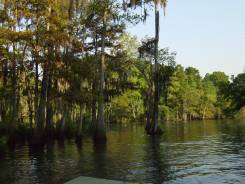Nacogdoche
Native American tribe From Wikipedia, the free encyclopedia
The Nacogdoche (Caddo: Nakúʔkidáawtsiʔ[1]) are a Native American tribe from eastern Texas.[2]
 Sabine River, Texas | |
| Total population | |
|---|---|
| Assimilated into Caddo Nation | |
| Regions with significant populations | |
( Oklahoma, formerly Texas) | |
| Languages | |
| Hasinai, English | |
| Religion | |
| Traditional tribal religion | |
| Related ethnic groups | |
| Other Hasinai tribes: Hainai, Nabedache, Nabiti, Nacono, Nadaco, Nasoni, Nechaui, Neche |
History
Summarize
Perspective
The Nacogdoche were part of the Hasinai branch of the Caddo Confederacy[2] and closely allied with the Lower Nasoni. They historically lived between the Angelina and the Sabine Rivers in Texas. The Gentleman of Elvas, a member of Hernando de Soto's 1541 expedition, wrote about the tribe, as did Francisco de Jesus Maria in 1691.[3]
In 1716, Franciscan friars accompanying Spanish explorer Domingo Ramón founded the Nuestra Señora de Guadalupe de los Nacogdoches Mission to serve the Nacogdoche as well as neighboring tribes.[4] In 1750, a Nacogdoche chief, Chacaiauchia, threatened to kill the presiding father at the mission, Father Calahorray Sanz, and demanded that all other Spaniards leave Nacogdoches territory.[3] This threat was not fulfilled. The mission remained until in 1773,[5] with brief dormant periods due to fear of French attack.[6]
The governor of Texas visited the Nacogdoche in 1752.[3] Their primary village, Nevantin, was located near present day Nacogdoches, Texas,[6] named for the tribe. Four mounds surrounded the site of Nevantin, until relatively recently.[3]
While Spanish colonizers claimed Nacogdoche land, the tribe traded freely with the French. French traders provided firearms, ammunition, metal-bladed knives, cloth, vermilion dye, and other sundries in exchange for horses, prepared animal hides, bear's fat, beans, corn, and Apache slaves.[3]
By 1800, European diseases and warfare had greatly reduced the population of the tribe. The survivors joined other Hasinai tribes.[4]
Ultimately, they were forced to relocate to the Wichita Reservation in Indian Territory in the 19th century.[4] Today they are enrolled in the Caddo Nation of Oklahoma.
Synonymy
The tribe is also known as the Nazadachotzi,[3] Nacadocheeto, Nacodissy, Nacodochito, Nagodoche, Nasahossoz, Naugdoche, Nocodosh,[4] and Neticatzi.[7]
See also
Notes
References
External links
Wikiwand - on
Seamless Wikipedia browsing. On steroids.
